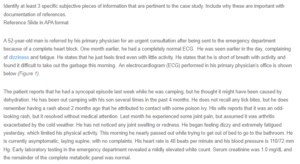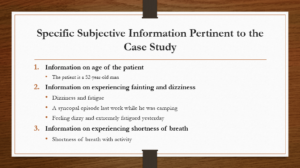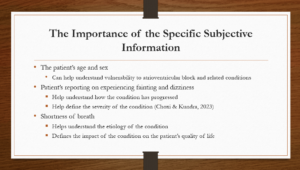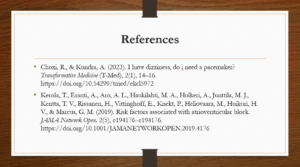Case Study Group Presentation – 52-year-old Man with Complete Heart Block
Hello, and welcome to this presentation on a case study involving a 52-year-old man who was referred by his primary physician for an urgent consultation after being sent to the emergency department because of a complete heart block.
The three specific subjective pieces of information pertinent to the case study focus on the patient’s age, and the report on specific complete heart block symptoms manifested, such as dizziness, fainting, and shortness of breath. The patient is a 52-year-old man. The subjective information provided by the patient and his wife shows that he has experienced episodes of fainting and dizziness, as well as shortness of breath. For instance, the patient’s wife reported that he had earlier complained of dizziness and fatigue. The patient also reports that he had a syncopal episode last week while he was camping and that he had begun feeling dizzy and extremely fatigued as from yesterday. The patient also states that he experiences shortness of breath with activity and found that he had found it hard to take out the garbage.
These three pieces of subjective information are important in understanding the condition the 52-year-old man has. Since subjective information obtained during a health assessment focuses on the patient’s current and past health status in relation to the particular condition of focus, it can help understand how the disease has developed over time, potential risk factors, and determine what needs to be tested objectively. For instance, the age and sex of the patient are important factors to consider in the diagnosis of complete heart block and other cardiovascular conditions. Old age and being male, besides any other underlying conditions, increase the risk of developing a complete heart block (Kerola et al., 2019). The age and sex of the patient can also help understand the patient’s vulnerability to the current atrioventricular block and the related conditions. The patient’s reporting on how and when they experience the symptoms, such as fainting, dizziness, and shortness of breath, is important in understanding how the condition has progressed with time. For instance, the patient reporting that he experienced dizziness earlier and extreme fatigue today shows that the condition is progressing. Such subjective information the patient reports can also help understand the severity of the condition and the need and choice of immediate intervention (Choxi & Kundra, 2023). Additionally, other subjective information reported by the patient may help understand the risk factors and triggers of the condition. For instance, the shortness of breath with physical activity identifies physical activity as a trigger for the symptoms, while the inability to perform physical activity shows how the condition impacts the patient’s daily living and quality of life.
Choxi, R., & Kundra, A. (2023). I have dizziness, do i need a pacemaker? Transformative Medicine (T-Med), 2(1), 14–16. https://doi.org/10.54299/tmed/ekcl5972
Kerola, T., Eranti, A., Aro, A. L., Haukilahti, M. A., Holkeri, A., Junttila, M. J., Kentta, T. V., Rissanen, H., Vittinghoff, E., Knekt, P., Heliovaara, M., Huikuri, H. V., & Marcus, G. M. (2019). Risk factors associated with atrioventricular block. JAMA Network Open, 2(5), e194176–e194176. https://doi.org/10.1001/JAMANETWORKOPEN.2019.4176
ORDER A PLAGIARISM-FREE PAPER HERE
We’ll write everything from scratch
Question

Complete Heart Block
Identify at least 3 specific subjective pieces of information that are pertinent to the case study. Include why these are important with documentation of references.
Reference Slide in APA format
A 52-year-old man is referred by his primary physician for an urgent consultation after being sent to the emergency department because of a complete heart block. One month earlier, he had a completely normal ECG. He was seen earlier in the day, complaining of dizziness and fatigue. He states that he just feels tired even with little activity. He states that he is short of breath with activity and found it difficult to take out the garbage this morning. An electrocardiogram (ECG) performed in his primary physician’s office is shown below (Figure 1).
The patient reports that he had a syncopal episode last week while he was camping, but he thought it might have been caused by dehydration. He has been out camping with his son several times in the past 4 months. He does not recall any tick bites, but he does remember having a rash about 2 months ago that he attributed to contact with some poison ivy. His wife reports that it was an odd-looking rash, but it resolved without medical attention. Last month he experienced some joint pain, but assumed it was arthritis exacerbated by the cold weather. He has not noticed any joint swelling or redness. He began feeling dizzy and extremely fatigued yesterday, which limited his physical activity. This morning he nearly passed out while trying to get out of bed to go to the bathroom. He is currently asymptomatic, laying supine, with no complaints. His heart rate is 48 beats per minute and his blood pressure is 110/72 mm Hg. Early laboratory testing in the emergency department revealed a mildly elevated white count. Serum creatinine was 1.0 mg/dL and the remainder of the complete metabolic panel was normal.





